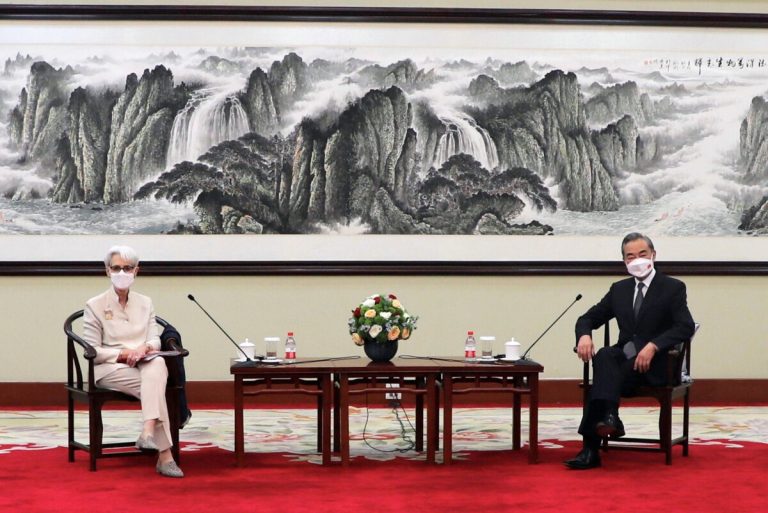U.S. and Chinese officials recently held meetings in Tianjin city on July 25 and 26. The Chinese side used the meetings to complain about Washington’s attitude towards the Chinese Communist Party (CCP) as well as portray the United States as a nation struggling with problems like the pandemic, treatment of minorities, and so on.
In a meeting with U.S. Deputy Secretary of State Wendy Sherman, PRC vice foreign minister Xie Feng blamed the United States for portraying China as an “imagined enemy,” arguing that America’s collaborative, competitive, and “adversarial rhetoric” is an attempt to “contain and suppress” China. He went on to claim that Beijing has “never coerced” any nation and that territorial expansion is “simply not in the Chinese DNA.”
Calling the United States the inventor and “intellectual property owner” of coercive diplomacy, the minister accused America of engaging with other nations from a position of strength, which he equated to bullying. Xie called America’s rules-based international order a Western attempt to impose their rules on other nations where “might is right and the big bully the small.” Instead, according to him, the communist regime will build a “new type” of international relations that features “mutual respect, equity, justice, and win-win cooperation.”
Xie blamed America for committing the genocide of Native Americans and engaging in wars that have brought “undue catastrophe” to the world. He asked that Washington address its own human rights issues. America is in “no position to lecture” China on human rights, he said, while terming claims of genocide and forced labor in Xinjiang as “completely slanderous.” He opposed the “politicization” of the COVID-19 pandemic origin, insisted that the One-China principle is the cornerstone of U.S.-China relations, and opposed U.S. sanctions related to Hong Kong.
Xie also gave Sherman two lists that outline the steps America must take to improve bilateral relations. This includes lifting sanctions on Chinese officials, removing visa limitations on Chinese students, lifting restrictions on Chinese companies, and so on.
China’s ‘red lines’
Success
You are now signed up for our newsletter
Success
Check your email to complete sign up
PRC foreign minister, Wang Yi, informed Sherman about three “red lines” Washington should not cross – (a) challenging the system of “socialism with Chinese characteristics,” (b) interrupting China’s development process, and (c) infringing China’s sovereignty, which includes accepting that Hong Kong, Xinjiang, and Tibet are not democracy or human rights issues.
Meanwhile, the U.S. State Department called the Tianjin meeting a “frank and open discussion.” Sherman told Wang that Washington was not seeking conflict with Beijing and that the Biden administration “welcomes the stiff competition.”
Sherman raised concerns about certain PRC activities in private, which includes issues like the crackdown on Hong Kong, genocide in Xinjiang, detention of American and Canadian citizens, Beijing’s conduct in the South China Sea, and so on.
Analysis
An analysis of the Tianjin meeting by SinoInsider, a political risk consultancy specializing in Chinese politics, observes that the CCP was “clearly more aggressive and demanding” than they were when the two nations last met in Anchorage, Alaska, in March. It said the PRC diplomats were engaging in “propaganda and disinformation.”
Almost all of Xie’s accusations against America are Marxist “whataboutism,” where arguments are fully framed in the context of the oppressor vs oppressed. The Chinese side used lies and disinformation to guilt-trip American delegates to take a non-confrontational approach towards the CCP regime.
The communist party is facing problems in the country in the form of pandemics, floods, an underperforming economy, and so on. Amidst these issues, the CCP might hype up the threat of America to make people “forget” the party’s issues. Moreover, Beijing might have sensed Washington’s unwillingness to take them head-on, which likely made the Chinese officials adopt a more aggressive posture during the Tianjin meeting.
“The Biden-Harris administration has demonstrated over the past six months that it will not adopt the Trump administration’s frank and outspoken approach to the ‘China challenge’, particularly in the crucial realm of ideological confrontation,” said the analysis. Many of the goodwill gestures shown by the Biden administration to China betray the claim that the U.S. was speaking from a position of strength.
While Sherman did raise critical issues, much of this was done in private, which only serves to help the Chinese side. The Trump administration kept the CCP on its toes by syncing “private and public messaging” and backing up words with “appropriate actions.”
“The CCP’s ambition to be the world hegemon also means that no amount of concessions from the U.S. will satisfy its ‘bottom line’, and the Biden-Harris administration will be naive if they believe the contrary,” the analysis warns.
Normalization or confrontation?
Based on the Tianjin meeting, SinoInsider theorizes that the Biden administration is likely following a policy of “normalization” of relations between the United States and China which would take the ties to the “pre-Trump and pre-Xi” era. However, the Biden administration might also take a more confrontational approach on issues that it is more comfortable with so as to win some political points back home; this will be in areas like cyberspace, human rights, supply chains, and technology.
“But if Washington truly wants to speak from a ‘position of strength’ and not make empty gestures, then it must show Beijing that the CCP’s ‘red lines’—which really reveal where the Party’s weaknesses lie—are not sacrosanct,” the SinoInsider analysis said.
To do so, the Biden administration can try adopting the previous administration’s “ideological approach,” the think tank says. This includes differentiating between CCP and the Chinese people, ending the practice of raising concerns privately and publicly raising human rights issues like the persecution of Tibetans, Falun Gong practitioners, Christians, the horrific practice of live organ harvesting, and so on.
The analysis warns that if Washington continues respecting CCP’s “red lines,” the Biden administration would only end up with more humiliating bilateral meetings like what happened in Anchorage, and followed up in Tianjin.















